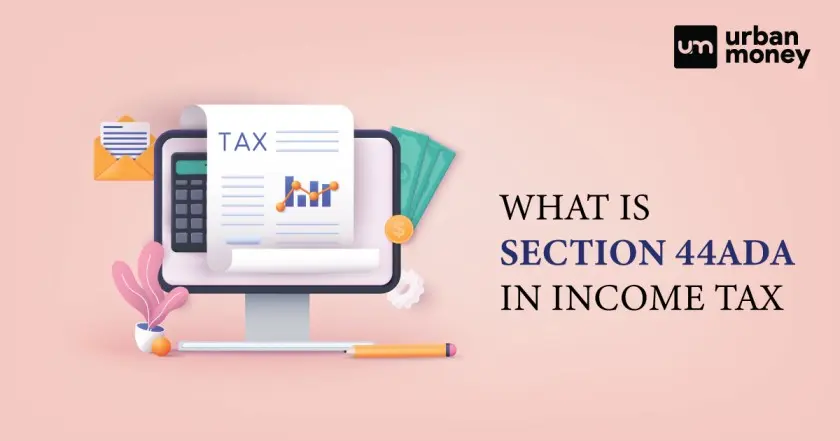- Home
- Income Tax
- Section 44ada Of Income Tax Act
Section 44ADA of Income Tax for Professionals

- Personalized solutions
- Expert guidance
- Application assistance
- Credit score discussion
- Interest rate comparison
Table of Content


Last Updated: 10 December 2025
Section 44ADA of the Income Tax Act, 1961 allows small professionals who earn less than Rs. 50 lakh per year from their profession to pay taxes on a presumptive basis. This means they can assume a certain percentage of their gross receipts as their taxable income and pay taxes accordingly without maintaining detailed accounting records. This scheme benefits doctors, lawyers, architects, and other professionals.
However, the recent budget for FY 2023-24 has revised the presumptive taxation limits to Rs. 75 lakhs, provided that at least 95% of the receipts are through online modes. This aims to promote digital transactions and reduce the compliance burden on taxpayers.
What is 44ADA in Income Tax?
Section 44ADA is a provision under the Income Tax Act of India that applies to professionals in certain specified professions, such as legal, medical, engineering, accounting, and others. It allows these professionals with gross receipts of up to Rs 50 lakh in a fiscal year to declare their income at a rate of 50% of their gross receipts without the need to maintain detailed accounting books.
However, if their income is less than 50% of their receipts and their total income is within the exemption limit, they must maintain accounting books and get audited. Professionals must note that they must pay tax on earnings from foreign-based clients. Overall, this provision aims to simplify tax compliance for professionals and reduce the burden of maintaining accounting records.
Objectives of Section 44ADA
The objectives of Section 44ADA in the Income Tax Act of India are:
- To simplify the tax compliance process for small professionals by allowing them to pay taxes based on their presumptive income at 50% of their gross receipts.
- To reduce the burden of maintaining detailed accounting records for small professionals whose gross receipts are at most Rs. 50 lakh in a financial year.
- To relieve small professionals from specific tax compliance requirements, such as maintaining books of accounts and getting them audited.
- To promote the growth of small businesses and entrepreneurship in India by providing a simpler tax regime for small professionals.
Which Professions Are Eligible Under Section 44ADA?
Section 44ADA of the Income Tax Act of India applies to professionals engaged in certain specified professions whose gross receipts do not exceed Rs 50 lakh in a financial year. The eligible professions under Section 44ADA include.
- Legal
- Medical
- Engineering
- Architecture
- Accountancy
- Technical consultancy
- Interior decoration
- Any other profession, as notified by the Central Government
Rate of Presumptive Tax under Section 44ADA
The presumptive tax rate under Section 44ADA of the Income Tax Act of India is 50% of the gross receipts the eligible professional receives in a financial year. This means that the eligible professional can declare their income for the financial year as 50% of the gross receipts and will be deemed to have earned income equal to that amount.
For example, if a professional in an eligible profession has gross receipts of Rs. 40 lakhs in a financial year, they can declare their income for that year as Rs. 20 lakhs (i.e. 50% of Rs. 40 lakhs), and they will be deemed to have earned an income of Rs. 20 lakhs for that year.
Benefits of Presumptive Income Under Section 44ADA
The benefits of presumptive income under Section 44ADA of the Income Tax Act of India are as follows:
- Simplified Tax Compliance: Professionals engaged in eligible professions can avail of the presumptive income scheme under Section 44ADA and declare their income at a rate of 50% of their gross receipts. This simplifies the tax compliance process, as they do not have to maintain detailed accounting books and can declare their income based on their gross receipts.
- Reduced Tax Liability: As the presumptive tax rate is only 50% of the gross receipts, eligible professionals can benefit from reduced tax liability compared to the actual income earned, which may be higher than the presumptive income.
- Exemption from Audit: Professionals availing of the presumptive income scheme under Section 44ADA are exempt from the audit requirement if their gross receipts do not exceed Rs—50 lakh in a financial year.
- Promotes Small Business and Entrepreneurship: Section 44ADA aims to promote small businesses and entrepreneurship in India by providing a simplified tax regime for professionals engaged in eligible professions.
Exemptions Under Section 44ADA
Professionals in eligible professions can opt for the presumptive income scheme under Section 44ADA of the Income Tax Act of India. However, they cannot claim certain deductions or exemptions under Sections 30 to 38 of the Income Tax Act if they choose to avail of this scheme. Some of the exemptions not available under Section 44ADA are:
- Deduction for Depreciation: Professionals cannot claim a deduction for depreciation under Section 32 of the Income Tax Act.
- Deduction for Expenses: Professionals cannot claim any deductions under Sections 30 to 38 of the Income Tax Act, including expenses incurred for business purposes, such as rent, salary, electricity bills, and other expenses.
- Loss Carry Forward: If the professional incurs losses in the business, they cannot carry them to the subsequent financial year and set them off against future profits.
Provision for Salaried Individuals Under the Presumptive Tax Regime
Salaried individuals are not eligible for the presumptive income scheme under Section 44ADA of the Income Tax Act of India. This scheme applies only to professionals engaged in eligible professions.
However, salaried individuals can avail of the presumptive tax regime under Section 44AD of the Income Tax Act. This provision allows taxpayers in certain businesses to declare their income tax at a prescribed rate without maintaining detailed books of accounts. The scheme is available to individuals, Hindu Undivided Families (HUFs), and partnership firms with a turnover of up to Rs. 2 crores in a fiscal year.
Under Section 44AD, eligible taxpayers can declare their income at a rate of 8% of their total turnover or gross receipts. However, if the declared income is less than 8% of the turnover or gross receipts, the taxpayer must maintain detailed books of accounts and get them audited.
Note: Salaried individuals who earn income from sources other than salary, such as rental income or income from investments, are not eligible for the presumptive tax scheme under Section 44AD. They will have to declare their actual income and maintain detailed books of accounts if required by the Income Tax Department.
Things to Consider Before Opting for Section 44ADA
Before opting for Section 44ADA of the Income Tax Act of India, individuals engaged in eligible professions should consider the following:
- Eligibility: Only professionals engaged in eligible professions with gross receipts of up to Rs. 50 lakh in a fiscal year is eligible for the presumptive income scheme under Section 44ADA.
- Maintaining books of accounts: While Section 44ADA does not require individuals to maintain detailed books of accounts, they must maintain essential records of their business transactions. If their income is less than 50% of their receipts and their total income exceeds the exemption limit, they must maintain detailed books of accounts and get them audited.
- Claiming deductions: Individuals opting for Section 44ADA cannot claim deductions under Sections 30-38 of the Income Tax Act, including depreciation and expenses incurred for business purposes.
- Tax liability on foreign income: If professionals accrue earnings from foreign-based clientele, they must pay tax on it.
- Comparison with other provisions: Individuals should compare the tax liability under Section 44ADA with that under other provisions of the Income Tax Act, such as Section 44AB (audit requirements for certain taxpayers) and Section 44AE (presumptive taxation for taxpayers engaged in the business of plying, hiring, or leasing goods carriages).
- Consultation with a tax expert: Individuals should consult with a tax expert to determine whether Section 44ADA is the best option for them and to ensure compliance with all applicable laws and regulations.
Calculation of Presumptive Income under Section 44ADA of Income Tax
Ms Priya is a legal consultant, and her gross receipts for the financial year 2021-22 are Rs. 50 lakhs. Her annual expenses, including rent, conveyance, telephone, and other business-related expenses, are Rs. 15 lakhs.
Under normal provisions:
Gross receipts: Rs. 50,00,000
Less: Expenses: Rs. 15,00,000
Net profit: Rs. 35,00,000
Under Presumptive Scheme:
Gross receipts: Rs. 50,00,000
Less: 50%
Deemed expenses: Rs. 25,00,000
Net profit: Rs. 25,00,000
In this case, the net profit under the presumptive scheme is lower than normal provisions, making it more beneficial for Ms Priya to opt for the presumptive taxation scheme under section 44ADA.
She must pay a tax of Rs 25,00,000 as her presumptive income. If her actual income is lower than the deemed income, she will still be required to pay tax on the deemed income. However, if her actual income is higher, she can declare it and pay tax on it.
Tax Audit and Books of Accounts for Presumptive Income under Section 44ADA
According to the Income Tax Act, maintaining books of accounts is mandatory for businesses if their income exceeds Rs. 1,20,000 or total sales, turnover or gross receipts exceed Rs. 10,00,000 in any of the three immediately preceding previous years.
However, for individuals and HUFs, this rule applies if the income is more than Rs. 2.5 lakhs or total sales, turnover or gross receipts exceed Rs. 25 lakhs in any of the three immediately preceding previous years.
Maintaining the books of accounts can result in a penalty of up to Rs. 25,000. Additionally, businesses with gross receipts exceeding Rs. 1 crore in a financial year must undergo a tax audit. The deadline for filing the tax audit report is September 30 of the assessment year, and it must be filed electronically via Form 3CD.
Taxpayers subject to tax audit must also file their return of income by September 30 of the assessment year. Generally, a tax audit report revision is only possible when the accounts have been revised.
FAQ's About Section 44ADA of Income Tax
How do I declare 44ADA in income tax?
To declare 44ADA in income tax, you need to file your income tax return (ITR). You must also choose the Presumptive Taxation Scheme under section 44ADA. In the ITR form, you must provide your total earnings. The system will then calculate your presumptive income automatically. You also need to report other incomes, if any, separately.
What is an example of section 44ADA?
For example, let’s say you are a freelance graphic designer and earned Rs. 20 lakhs in the financial year. You can opt for the presumptive taxation scheme under section 44ADA, and your taxable income will be considered as 50% of your gross receipts (i.e., Rs. 10 lakhs), and you will be taxed accordingly.
What is the limit of section 44ADA of the Income Tax Act?
Section 44ADA of the Income Tax Act applies to professionals whose gross receipts do not exceed Rs 50 lakhs in a financial year.
Can a salaried person claim 44ADA? Who cannot opt for 44ADA?
No, a salaried person cannot claim 44ADA. Section 44ADA applies only to professionals whose income is generated from a specified profession. Individuals who earn income from any other source, such as salary or capital gains, cannot opt for the scheme.
Who cannot opt for 44ADA?
Section 44ADA does not apply to individuals who have opted for the presumptive taxation scheme under section 44AD, taxpayers who have claimed deduction under sections 10AA, 10BA, or 80JJAA, and persons with income from more than one profession.
Can 44ADA be taken for more than 50 lakhs?
Section 44ADA applies only to professionals whose gross receipts do not exceed Rs 50 lakhs in a financial year. If the gross receipts exceed this limit, the taxpayer must file regular income tax returns and maintain books of accounts.
